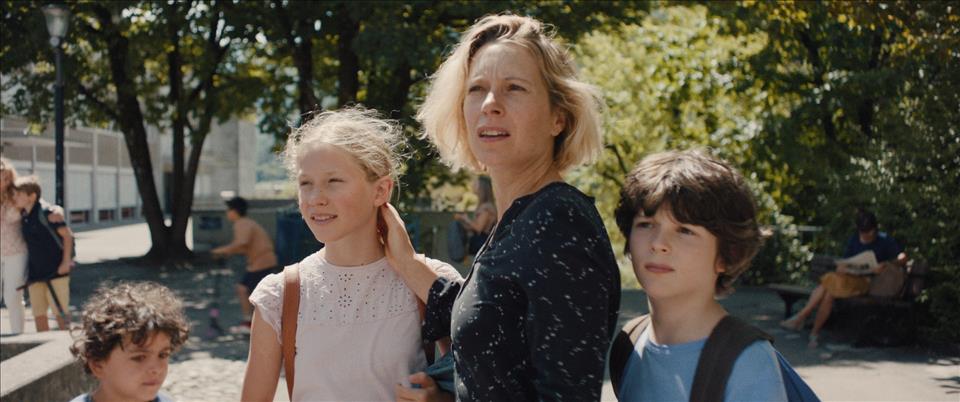
The Courageous: A Powerful Work Of Social Realism About A Rebellious Mother Searching For Her Place In The World
Another cut, this time behind Jule's head, reveals the breathtaking mountain scenery of the Swiss Valais. In just over a minute we meet the people and places, the tensions and contrasts, that drive the film, even if full understanding will only come to us gradually. Jule, a rebellious young woman bringing up her children alone, is fundamentally at odds with the ordered society of rural Switzerland, and in consequence her life is a constant struggle.
The Courageous is director Jasmin Gordon's first feature film. It lies within the strong tradition of engaged social realism that, in Britain, we associate with Ken Loach, but the genre has its own life across the channel too, with eminent exponents like Laurent Cantet in France or the brothers Jean Pierre and Luc Dardenne in Belgium.
These are films that depend on their close attention to the particular circumstances of particular individuals in a particular place, and so they are always unique – as well as being extremely varied in their directors' chosen styles and narrative choices. Still they follow a recognisable pattern, drawing us into the struggles of marginalised protagonists trapped by a hostile world.
Gordon involves us in Jule's world largely through her canny management of the children's viewpoint. From the start they are always observing their mother, and so are we: Gordon quickly encourages us to feel that we are reading her along with the children. But this is an illusion. We know less than they do, we judge according to our own stereotypes and we misunderstand.
The film knows that we will misunderstand, and takes pleasure in baiting our anxieties, gradually revealing our mistakes, and so involving us ever more closely in the family's difficult life. Jule is not perfect, but she has an iron determination, and we feel her love for her children and her humiliation as every attempt to better her life through the“proper” channels is systematically beaten down.
Outside the close family group, people exist entirely as cogs in the system that doesn't care for a woman like Jule. This is to some extent a characteristic of the genre, but Gordon takes it to an extreme: these cogs are always individuals, and sometimes you can see that Jule is putting them in an impossible situation too, but they act according to their place in the social machine, excluding and humiliating Jule because they must, some reluctantly, some with bitter pleasure.
While Loach's characters usually maintain some alliances and tentative solidarity with groups outside the family, Gordon denies Jule any complicities at all, which in turn denies her any space to articulate her situation. She will not even confide in her daughter, despite the latter's assurances that she's old enough to understand. So it's up to us to make sense of Jule's experiences, and, in our programmed role of audience, we can only watch helplessly.
Jule and her children lives in a city on the edge of wilderness, to which they can escape. The Courageous/MetFilm
Gordon's only tentative route to hope, and one of the film's great structuring contrasts, is in fact the setting – and so we return to that puzzling opening shot. The place is of paramount importance.
On the one hand there's the urban network, and the cheap modern buildings, all cubes and corridors, in which the family's life is mostly spent. It is, paradoxically, easy to move around, and the obstacles it presents are quite negotiable: even the motorway can be crossed with no more than a brief intake of breath. Jule is good at circulating in it, finding its cracks and corners, knowing where it hides its treasures – but it forms a continuous closed system in which the guardians will catch up with you eventually.
But, opening out from within this urban space, there is nature: not so much the picture-postcard mountains, which are more enclosing than liberating (no question here of that immortal trope of British social realism, the“view of our town from that hill”), but a more intimate nature that offers the family its happiest moments – a swim in a lake, a fortuitous fruit tree. The green woods do offer an exit, but they are worryingly fragile and utopian.
This is a powerful film but it offers little hope of an outlet for Jule's undoubted courage. I was gripped by the family's story, even if, thinking it over at more leisure later on, some doubts crept in as to how far this social despair may get us. At least, perhaps, it will take us to understanding, which is precious.
Looking for something good? Cut through the noise with a carefully curated selection of the latest releases, live events and exhibitions, straight to your inbox every fortnight, on Fridays. Sign up here .

Legal Disclaimer:
MENAFN provides the
information “as is” without warranty of any kind. We do not accept
any responsibility or liability for the accuracy, content, images,
videos, licenses, completeness, legality, or reliability of the information
contained in this article. If you have any complaints or copyright
issues related to this article, kindly contact the provider above.
Most popular stories
Market Research

- Mutuum Finance (MUTM) New Crypto Coin Eyes Next Price Increase As Phase 6 Reaches 50% Sold
- Bydfi Highlights 'BUIDL' Ethos During Newcastle United Match Against Arsenal
- Flexm Recognized As“Highly Commended” In The Regtech Category At The Asia Fintech Awards Singapore 2025
- Solotto Launches As Solana's First-Ever Community-Powered On-Chain Lottery
- Moonx: The Leading Crypto Trading Platform With X1000 Leverage And Unlimited Meme Coin Access
- Stonehaven Circle Marks 13Th Anniversary With Hadrian Colwyn Leading Calvio Ailegacyx Innovation




















Comments
No comment